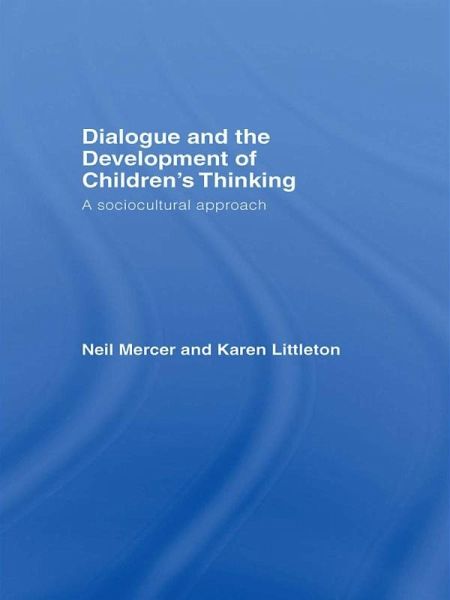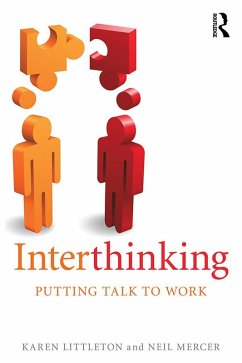
Dialogue and the Development of Children's Thinking (eBook, PDF)
A Sociocultural Approach
Versandkostenfrei!
Sofort per Download lieferbar
44,95 €
inkl. MwSt.
Weitere Ausgaben:

PAYBACK Punkte
22 °P sammeln!
This book draws on extensive research to provide a ground-breaking new account of the relationship between dialogue and children's learning development. It closely relates the research findings to real-life classrooms, so that it is of practical value to teachers and students concerned that their children are offered the best possible learning opportunities.The authors provide a clear, accessible and well-illustrated case for the importance of dialogue in children's intellectual development and support this with a new and more educationally relevant version of socio-cultural theory, which expl...
This book draws on extensive research to provide a ground-breaking new account of the relationship between dialogue and children's learning development. It closely relates the research findings to real-life classrooms, so that it is of practical value to teachers and students concerned that their children are offered the best possible learning opportunities.
The authors provide a clear, accessible and well-illustrated case for the importance of dialogue in children's intellectual development and support this with a new and more educationally relevant version of socio-cultural theory, which explains the fascinating relationship between dialogues and learning. In educational terms, a sociocultural theory that relates social, cultural and historical processes, interpersonal communication and applied linguistics, is an ideal way of explaining how school experience helps children learn and develop.
By using evidence of how the collective construction of knowledge is achieved and how engagement in dialogues shapes children's educational progress and intellectual development, the authors provide a text which is essential for educational researchers, postgraduate students of education and teachers, and is also of interest to many psychologists and applied linguists.
The authors provide a clear, accessible and well-illustrated case for the importance of dialogue in children's intellectual development and support this with a new and more educationally relevant version of socio-cultural theory, which explains the fascinating relationship between dialogues and learning. In educational terms, a sociocultural theory that relates social, cultural and historical processes, interpersonal communication and applied linguistics, is an ideal way of explaining how school experience helps children learn and develop.
By using evidence of how the collective construction of knowledge is achieved and how engagement in dialogues shapes children's educational progress and intellectual development, the authors provide a text which is essential for educational researchers, postgraduate students of education and teachers, and is also of interest to many psychologists and applied linguists.
Dieser Download kann aus rechtlichen Gründen nur mit Rechnungsadresse in A, B, BG, CY, CZ, D, DK, EW, E, FIN, F, GR, HR, H, IRL, I, LT, L, LR, M, NL, PL, P, R, S, SLO, SK ausgeliefert werden.













